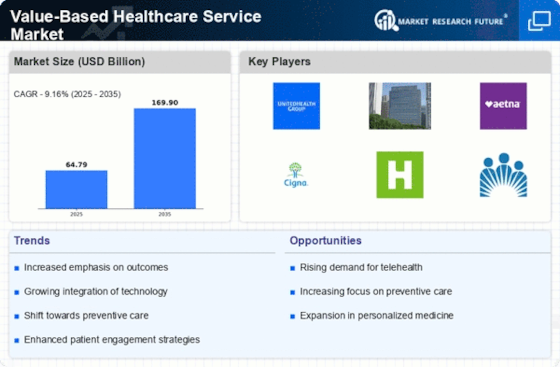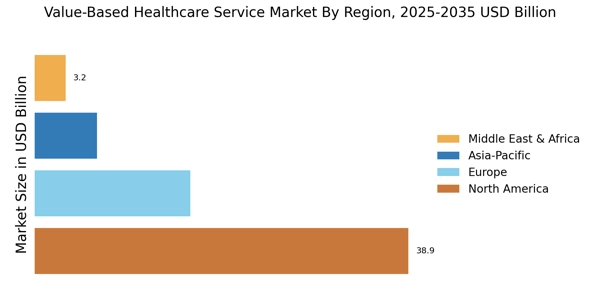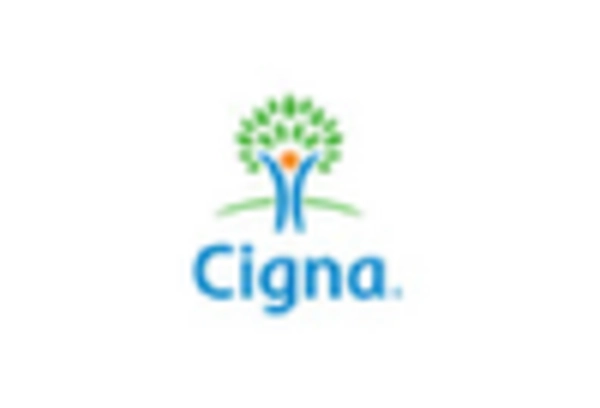Rising Healthcare Costs
The escalating costs associated with traditional healthcare models are driving the shift towards the Value-Based Healthcare Service Market. As expenditures continue to rise, stakeholders are increasingly seeking cost-effective solutions that prioritize patient outcomes over volume of services. In 2023, healthcare spending reached approximately 4 trillion dollars, prompting a reevaluation of existing payment structures. This financial pressure encourages healthcare providers to adopt value-based models that align incentives with patient health outcomes. By focusing on quality rather than quantity, the Value-Based Healthcare Service Market aims to reduce unnecessary procedures and hospitalizations, ultimately leading to a more sustainable healthcare system. The potential for cost savings, alongside improved patient satisfaction, positions value-based care as a compelling alternative in the current economic landscape.
Shift Towards Preventive Care
There is a notable shift towards preventive care within the Value-Based Healthcare Service Market, driven by a growing recognition of the importance of early intervention. Preventive care strategies aim to reduce the incidence of chronic diseases, which account for a significant portion of healthcare expenditures. In 2025, it is estimated that nearly 75% of healthcare costs are attributed to chronic conditions, underscoring the need for effective preventive measures. By focusing on wellness and proactive health management, the Value-Based Healthcare Service Market seeks to improve population health outcomes while simultaneously lowering costs. This emphasis on prevention aligns with the broader goals of value-based care, which prioritize long-term health benefits over short-term treatments.
Consumer Demand for Quality Care
Increasing consumer awareness and demand for quality healthcare services are propelling the Value-Based Healthcare Service Market forward. Patients are becoming more informed about their healthcare options and are actively seeking providers that prioritize quality and outcomes. This shift in consumer behavior is influencing healthcare providers to adopt value-based models that emphasize patient satisfaction and engagement. In 2025, surveys indicate that over 60% of patients consider quality of care as a primary factor in their healthcare decisions. As a result, healthcare organizations are compelled to enhance their service offerings and align with value-based principles to meet consumer expectations. This growing demand for quality care not only drives competition among providers but also reinforces the importance of value-based care in the evolving healthcare landscape.
Technological Advancements in Healthcare
The rapid advancement of technology is a pivotal driver for the Value-Based Healthcare Service Market. Innovations such as telemedicine, electronic health records (EHRs), and data analytics are transforming how care is delivered and monitored. These technologies enable healthcare providers to track patient outcomes more effectively and personalize treatment plans based on real-time data. In 2025, it is projected that the integration of artificial intelligence in healthcare will enhance decision-making processes, further supporting value-based care initiatives. By leveraging technology, the Value-Based Healthcare Service Market can improve efficiency, reduce costs, and ultimately enhance patient care. The ongoing evolution of healthcare technology suggests a promising future for value-based models, as they become increasingly reliant on data-driven insights.
Regulatory Support and Policy Initiatives
Government policies and regulatory frameworks are increasingly favoring the transition to value-based care, significantly impacting the Value-Based Healthcare Service Market. Initiatives such as the Medicare Access and CHIP Reauthorization Act (MACRA) have established incentives for providers to deliver high-quality care. These policies encourage the adoption of value-based payment models, which are designed to improve patient outcomes while controlling costs. As of 2025, a substantial portion of Medicare payments is expected to be linked to value-based care metrics, reflecting a broader trend across various healthcare systems. This regulatory support not only facilitates the growth of the Value-Based Healthcare Service Market but also fosters innovation in care delivery, as providers seek to meet the evolving standards set forth by policymakers.

















